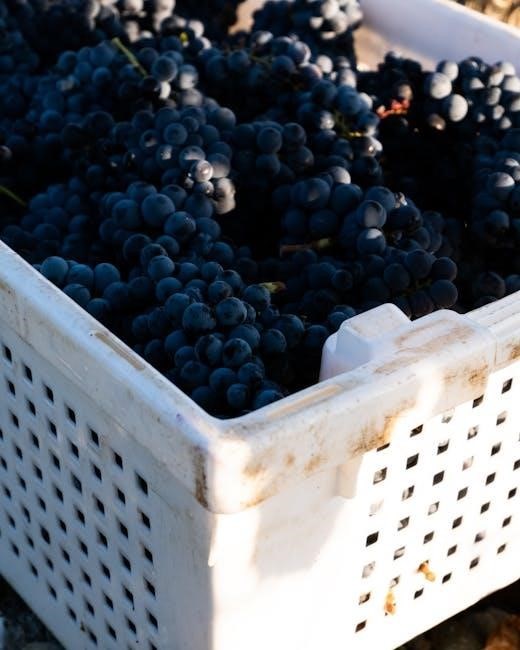Michael Pollan’s In Defense of Food is a manifesto advocating for a return to simple, whole foods and rejecting modern nutritionism. Pollan critiques the Western diet’s focus on nutrients over food, emphasizing the importance of cultural and culinary traditions to restore healthy eating habits and reconnect with the joy of food.
Overview of Michael Pollan’s Manifesto
In In Defense of Food, Michael Pollan presents a compelling manifesto that challenges the conventional wisdom of modern nutrition. He argues that the Western diet, dominated by processed foods and nutrient-focused ideologies, has led to widespread health crises. Pollan advocates for a return to whole, unprocessed foods and simple eating principles, emphasizing the importance of cultural and culinary traditions. His central message—”Eat food. Not too much. Mostly plants.”—serves as a guide to reclaiming healthy eating habits. By critiquing nutritionism and the industrial food system, Pollan encourages readers to rethink their relationship with food and adopt a more mindful, pleasurable approach to eating.

The Importance of Simple Eating Principles
Michael Pollan underscores the significance of simple eating principles as a solution to the modern dietary confusion. He argues that overcomplicating food choices with nutritional science has led to poor health outcomes. By advocating for straightforward guidelines such as “Eat food. Not too much. Mostly plants,” Pollan emphasizes the value of whole, unprocessed foods over nutrient-focused diets. These principles, rooted in traditional wisdom, encourage mindful eating and a return to the pleasures of the table. Simplifying our approach to food, Pollan believes, can help us break free from the cycle of dieting and nutritionism, fostering healthier relationships with what we eat and how we live.

The Core Principles of the Book

Eat food. Not too much. Mostly plants. These simple principles guide Michael Pollan’s approach, emphasizing whole, unprocessed foods and a balanced diet rooted in traditional wisdom and nature.
“Eat Food. Not Too Much. Mostly Plants.”
Michael Pollan’s central mantra, “Eat food. Not too much. Mostly plants,” simplifies the complexities of modern eating. This principle urges a return to whole, unprocessed foods, avoiding the artificial and highly refined products dominating Western diets. By prioritizing plants, Pollan advocates for a balanced intake of fruits, vegetables, and whole grains, which are rich in nutrients and fiber. The phrase also emphasizes moderation, discouraging overconsumption and promoting mindful eating. This approach challenges the nutritionism that reduces food to its components, instead championing a holistic view of diet rooted in nature and tradition. Pollan’s guidance encourages readers to reconnect with the simplicity and joy of eating real food.
Critique of Modern Nutritionism
Michael Pollan delivers a scathing critique of modern nutritionism, arguing that it has distorted our relationship with food; By breaking food into individual nutrients, nutritionism oversimplifies complex dietary needs and fosters confusion. This approach has led to the rise of processed foods marketed as “healthy” due to their nutrient content, rather than their wholesomeness. Pollan contends that such reductionism neglects the interconnectedness of food components and the body’s ability to process whole foods. He also points out that the constant stream of conflicting scientific studies has left consumers disillusioned and more reliant on industrialized food products. Pollan’s critique calls for a rejection of this fragmented view of nutrition, advocating instead for a return to unprocessed, naturally occurring foods that promote true health and well-being.
The Role of Whole, Unprocessed Foods
Michael Pollan emphasizes the critical role of whole, unprocessed foods in achieving optimal health. These foods, which are as close to their natural state as possible, provide essential nutrients, fiber, and satiety cues that processed alternatives lack. Pollan argues that whole foods like vegetables, fruits, whole grains, and lean proteins are inherently balanced and require no nutritional labeling to validate their health benefits. By focusing on these foods, individuals can avoid the pitfalls of modern nutritionism and reconnect with the natural, intuitive way of eating. This approach aligns with traditional culinary wisdom and promotes long-term well-being, reducing the risk of chronic diseases associated with processed diets.
The Age of Nutritionism
Nutritionism transformed how we view food, reducing it to its nutrient components rather than whole meals. This shift led to confusion and unhealthy dietary choices, Pollan argues.

From Foods to Nutrients: A Shift in Perspective
Michael Pollan highlights how modern society transitioned from viewing food as whole, nourishing meals to focusing on individual nutrients. This shift, rooted in the rise of nutrition science, has led to widespread confusion about healthy eating. By breaking food into components like vitamins, minerals, and macronutrients, we lost sight of food’s holistic benefits. Pollan argues that this reductionist approach has fostered an unhealthy obsession with “nutrients” rather than “food,” contributing to the dominance of processed products marketed for their nutritional claims. This perspective has eroded traditional eating wisdom and deepened our disconnect from the natural, cultural, and sensory aspects of food.
Nutritionism Defined: Understanding the Concept
Nutritionism, as Pollan explains, is the belief that the value of food lies primarily in its nutritional components rather than its whole form. This ideology emerged from the scientific study of vitamins and nutrients, leading to a fragmented view of diet. Nutritionism fosters an obsession with individual nutrients, often at the expense of the food itself. It promotes a reductionist approach, where foods are judged by their vitamin or mineral content rather than their culinary or cultural value. Pollan argues that this mindset has fueled the rise of highly processed “health” products and confused consumers, undermining the simple, timeless wisdom of eating whole, unprocessed foods.

The Golden Age of Food Science
The so-called “Golden Age of Food Science” refers to the period when scientists discovered essential nutrients like vitamins and minerals. This era sparked hope for improving public health through targeted dietary interventions. However, Pollan argues that this focus on individual nutrients overshadowed the importance of whole foods. The emphasis on “good” and “bad” nutrients led to a fragmented understanding of diet, promoting processed foods designed to meet specific nutritional criteria. This shift away from traditional, unprocessed foods has contributed to the modern dietary crisis, as people prioritize nutrients over the cultural and culinary value of real food.

The Impact of the Western Diet
The Western diet’s reliance on processed foods has led to a decline in health, despite increased nutritional knowledge, highlighting a paradox where obsession with diet correlates with poor health outcomes.
The American Paradox: Health vs. Nutrition Obsession
The American paradox, as highlighted in In Defense of Food, reveals a striking contradiction: despite an increased focus on nutrition, health outcomes in the West have deteriorated. While Americans obsess over diet and nutritional science, rates of chronic diseases like obesity, diabetes, and heart disease continue to rise. This paradox underscores the failure of modern nutritionism, which often prioritizes individual nutrients over whole, unprocessed foods. The shift from traditional, culturally rooted eating practices to a diet dominated by processed foods has exacerbated this issue. Pollan argues that the Western diet’s emphasis on convenience and nutrient-focused eating has led to widespread confusion, further disconnecting people from the simple, intuitive act of eating well.
The Decline of Traditional Eating Wisdom
Michael Pollan highlights the erosion of traditional eating wisdom in modern society, where cultural and familial dietary practices have been replaced by scientific jargon and fad diets. Historically, people intuitively understood what to eat, guided by centuries of culinary traditions. However, the rise of industrialized food and nutritionism has disrupted this wisdom, leading to confusion and mistrust in natural eating instincts. The decline of home cooking and shared meals has further exacerbated this trend, as people increasingly rely on processed foods and expert advice rather than inherited knowledge. This shift has disconnected eating from its cultural and communal roots, reducing it to a mere biological function rather than a meaningful experience.

Practical Advice for Healthy Eating
Michael Pollan offers practical advice: eat whole, unprocessed foods, emphasizing plants, and avoid the Western diet’s processed offerings. Simple, intuitive eating promotes better health naturally.
Rediscovering the Pleasures of Eating
Michael Pollan emphasizes reconnecting with the joy of eating by embracing whole, unprocessed foods and traditional cooking methods. He advocates for mindful consumption, savoring meals, and breaking free from the cycle of dieting. Pollan suggests that by rediscovering the pleasures of eating, individuals can foster healthier relationships with food and reduce reliance on industrialized products. This approach not only enhances flavor but also supports physical and mental well-being, aligning with Pollan’s philosophy of simple, intuitive eating. His advice encourages a cultural shift, prioritizing enjoyment and balance over rigid dietary rules.
Escape from the Western Diet
Michael Pollan argues that escaping the Western diet, dominated by processed and nutrient-focused foods, is crucial for restoring health. He highlights the “American paradox”: despite obsession with nutrition, chronic diseases like obesity and diabetes persist. Pollan attributes this to the replacement of whole foods with industrial products. Breaking free from the Western diet involves rejecting processed foods and embracing traditional, whole foods. Pollan suggests focusing on plants, minimizing sugar and refined carbohydrates, and avoiding products with lengthy ingredient lists. By returning to simple, unprocessed foods, individuals can escape the cycle of dieting and regain control over their health. This shift aligns with Pollan’s philosophy of intuitive eating and cultural culinary wisdom.
The Cultural and Historical Significance of Food
Food holds deep cultural and historical value, preserving traditions and connecting communities. Early techniques like drying, salting, and fermenting ensured survival and highlighted food’s enduring significance across generations.
Food as a Cultural Element
Food serves as a profound reflection of cultural identity, preserving traditions and community values across generations. It embodies the history, beliefs, and practices of societies, fostering a sense of belonging. Culinary traditions, passed down through families, highlight food’s role in celebrating heritage and creating shared experiences. Pollan emphasizes that food is more than sustenance; it is a cultural language, connecting people to their roots and fostering unity. By embracing traditional eating practices, we honor the cultural significance of food, ensuring its role in shaping identities and strengthening social bonds. This cultural dimension underscores the importance of preserving food’s historical and communal value in modern times.
Historical Techniques for Food Preservation

Throughout history, humans developed ingenious methods to preserve food, ensuring survival during scarcity. Techniques like drying, salting, and fermenting were pivotal in extending shelf life. These practices not only preserved nutrients but also enhanced flavors and textures, creating iconic dishes. Pollan highlights how such methods, rooted in tradition, were essential before modern refrigeration. They allowed communities to thrive by safeguarding food supplies and fostering culinary diversity. These preservation techniques are a testament to human ingenuity and cultural adaptability, emphasizing the connection between food, history, and sustainability. By revisiting these methods, we can appreciate the wisdom of our ancestors and their deep understanding of food’s enduring value.
